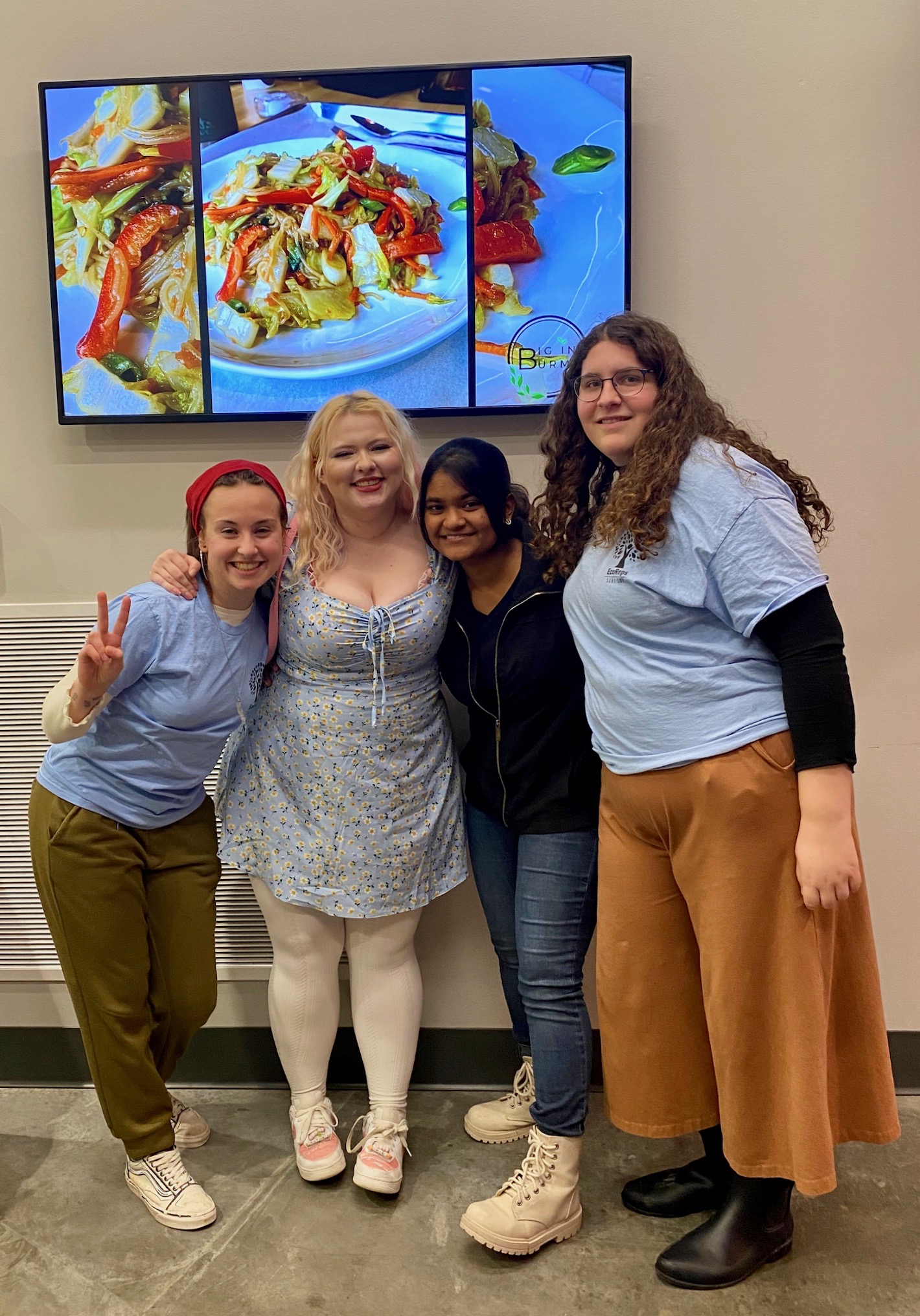Recent Headlines
Sustainability Lessons Taught by Peers

ESF Ecoreps at the Museum of Science and Technology in Syracuse: From right, Evangeline Delovich, Bella Osborn, Abhinaya Polka and Kathryn Resanovich
Some of the responsibility for helping ESF's newest students 'walk the walk' of sustainability has been placed in the hands of those who know them best—their peers.
In 2021, the College rejuvenated the longstanding EcoReps peer-to-peer education program. Through the EcoReps program, the College hires residents of Centennial Hall to educate their fellow students about how to live sustainably on and off campus. EcoReps teach their peers about the core tenets of sustainability; promote environmentally conscious decision-making; encourage sustainable lifestyles; and foster a connection with the campus community and greater Syracuse area. The students develop and deliver content around monthly themes and collaborate with ESF's Sustainability Division to align EcoReps program content with the College's sustainability goals and priorities. They make practicing sustainability fun and accessible for students and adapt the program to meet the interests of Centennial Hall residents.
"The biggest benefit to this program is the peer to peer-education aspect," said Sue Fassler, ESF's director of sustainable operations. "Students best understand the way to reach follow students. They know where knowledge gaps are and what types of content and outreach will resonate."
Monthly themes include food, conservation, water, energy, zero waste, and transportation. Every month, the EcoReps create a chalkboard display featuring educational content, develop social media posts, and plan and lead an educational or experiential activity (such as a movie, discussion, field trip, or competition). In November, for example, EcoReps developed a Nature Scavenger Hunt that sent participants hunting for 12 species of plants or animals found living on campus or preserved in a collection. Participants used clues to identify and draw the species in question for prizes and had a great time exploring campus. In February, EcoReps used an Energy Dashboard created by the Sustainability Division to compare this year's energy usage to years past. This outreach tool assisted EcoReps as they educated their peers about how they can reduce energy consumption in Centennial Hall through simply daily actions.
Everyday Sustainability
Student Sustainability Coordinators Delaney Demro (GPES '21) and Liam Grima (environmental studies '25), took a lead role in revamping the program over the summer.
"There can be an additional culture shock in coming to ESF on top of adjusting from high school to college life," Demro said. "It's because at ESF, we strive to go above and beyond and practice what ESF teaches. We try to be sustainable in our everyday lives and in campus operations. Students want to fit into our culture and live more sustainably, but it can be a lot to learn."
Working on the program appealed to Demro because it meant more than teaching students the concepts of sustainability – it was a way to give them the tools to take action.
The program is now managed by Fassler; Demro, in her new role as sustainability education and engagement manager; Justin Heavey, ESF's sustainability and research program manager; and Megan Catalano, residential experience coordinator in Centennial Hall.
While the program is overseen by the College, Fassler said the EcoReps themselves are the ones running the program. "They are in charge of educating their fellow 'Centen' residents about these areas. Goals are set and they can meet them as they see fit, guided by the sustainability staff and the Centennial Hall staff. We meet monthly and they know they can always reach out to us if they need help."
EcoReps is a common best practice for campus sustainability replicated at college residence halls around the country. EcoReps at ESF began as a grassroots initiative by student volunteers in 2012, shortly after Centennial Hall opened. By 2015, the program evolved into a paid internship opportunity sponsored and supported by the Sustainability Division.
Connecting through a Common Interest
ESF junior Bella Osborn says the best thing about being an EcoRep in Centennial Hall is tailoring the program to focus on specific, engaging ideas that entice students to learn more about protecting the environment.
As an example, Osborn said that instead of approaching recycling from a broad perspective, this year the EcoReps shared information about environmentally friendly ways to dispose of makeup and arts supplies.
"The biggest accomplishment this semester, in my eyes, has been our painting night, when we had 30 people come out to paint, have a good time and learn how to filter out the microplastics from paint water," she said. The students who participated left the session with a completed art project.
Osborn, a junior from South Glens Falls, New York, who is majoring in conservation biology, said she got involved with the EcoRep program because it was an opportunity to connect with her peers through a common interest – the environment.
"EcoReps has provided a direct learning path for my peers and even the EcoReps themselves," she said. "I've had a wonderful time working as an EcoRep and I'd love for more people to come and check us out."
Ready to Get Involved?
If you'd like to get involved in sustainability projects at ESF, let us know with an email to [email protected].